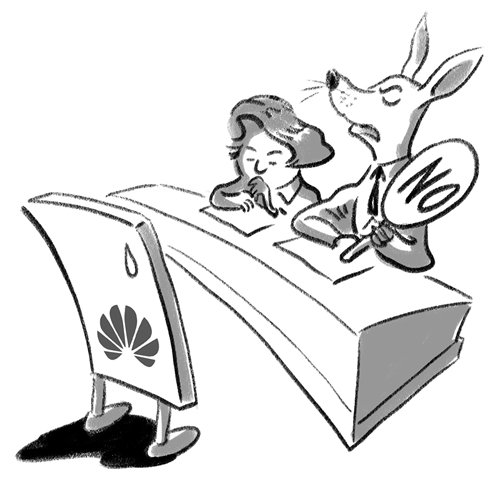The Australian government has banned Chinese technology giant Huawei from the rollout of the 5G mobile infrastructure network over what it called "security concerns." This is likely to act as a dampener in Australia-China relations.

Illustration: Liu Rui/Global Times
Huawei is accused of having connections to the Chinese government in Australian media, a deliberate attempt to bring politics into technology cooperation. As a privately owned multinational corporation with outstanding industry performance and good reputation all over the world, Huawei has 180,000 employees across 170 countries. It is developing 5G technology in cooperation with many other countries around the world. There is hardly any factual basis to the accusation against Huawei that it is supported by the Communist Party of China. Australia's discrimination against Huawei demonstrates its mistrust of China both politically and culturally.
Barring Huawei from the rollout process of the high-speed 5G mobile network is obviously driven by political and commercial interests, but is not in line with Australia's national interests. Since Huawei has been banned, its competitors might monopolize the market, which could lead to ordinary consumers paying more for worse services.
Politically, Australia will have a federal election next year, and both the ruling National Party and the opposition Labour Party are developing election strategies and competing to take the lead in opinion polls by creating fear and panic over national security. Hyping up security loopholes in 5G technology is a ploy to exacerbate the fear. It can be seen that Huawei has become the victim of a political struggle between the two parties.
Concerns about the safety of technical equipment can be solved by technology. Countries such as the UK, Canada, New Zealand and so on have managed to benefit from Huawei's technology under their own national security framework. The Huawei Cyber Security Evaluation Centre, set up jointly by the company and the UK government, examines every hardware and software product produced by Huawei before it goes to the UK market. Australia's concerns about cyber security are understandable, but they can be similarly dealt with.
The Australian move is also a grave violation of the free trade rules of fair competition and non-discrimination. China and Australia have signed a Free Trade Agreement. Australia's banning Huawei from the 5G market competition over "security concerns" is a violation of the spirit of free trade. Huawei's network security record in Australia is clean.
Besides, the company is also committed to innovation and development in Australia, investing $20 million in setting up a national training and innovation center in Sydney. The ban is a proof that the Australian government treats Chinese enterprises unfairly. Huawei, a law-abiding taxpayer, has been excluded from the 5G network market in Australia on a false charge of cyber security.
Huawei has become the world's largest seller of telecommunications equipment and the third largest seller of mobile phones, with a total revenue of $92.5 billion last year. Whereas the company's revenue in Australia is only $623 million, which is quite insignificant for such a flourishing multinational enterprise.
The ban on Huawei 5G will hurt the improving Sino-Australian relations. In his speech at the University of New South Wales, Australian Prime Minister Malcolm Turnbull spoke highly of the achievements of cooperation in innovation and technology research and development between the two countries and expressed hope that bilateral relations will develop on the basis of mutual respect and understanding. Nevertheless, what matters more is taking concrete steps to practice "respect" and "understanding," instead of just talking.
The author is director of the Institute of Asia-Pacific Studies at the China Institute of International Studies.


